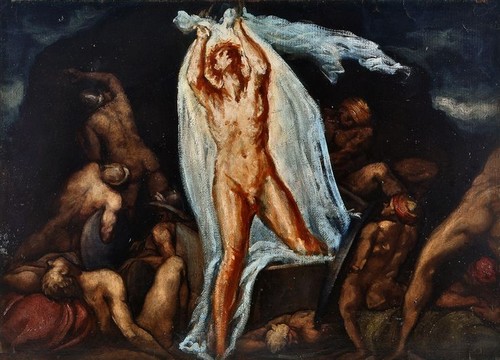
Resurrection - É. Bernard
Last week, in my post about George Butterworth, I mentioned several times Ralph Vaughan Williams, their friendship and their common interest in folk English music. Their careers were parallel until the war; Vaughan Williams was thirteen years older than Butterworth but started to compose later and their early works came just about together. I just wonder if Butterworth would have been as successful as his friend If he had not died so young.
While preparing the post, I came across the Five Mystical Songs by Vaughan Williams, composed the same year than the songs from A Shropshire Lad by Butterworth, and I thought it would be nice to have them back this week, after listening to one of them four years ago, also at Easter.
This cycle was commissioned by the Three Choirs Festival and was premiered in 1911, in Worcerster, the year after the premiere of two well-known works at present: A Sea Symphony and the Fantasia on a Theme by Thomas Tallis. The verses of the songs are by George Herbert, born in 1593 into a noble family; he excelled in poetry and music, and for a time, he attended the University of Cambridge, before being required as a Member of Parliament. But he had a religious vocation and when he was thirty-six, he left his comfortable life to become the rector in a little parish; Three years later, he died of tuberculosis. His poems, approximately 160, were published posthumously the year he died, in 1633, and were put together in the volume The Temple; It became so popular that sixty years later, thirteen editions were already published.
Vaughan Williams chose four poems by Herbert (one of them was split into two songs) to compose his cycle, which was at first for a baritone, a choir and an orchestra. The composer later produced other versions: with piano and string quintet, with piano and without choir; When I shared the first song of the cycle, Easter, I chose the voice and piano version, which has a more intimate atmosphere. Today, I'm sharing the fourth song, The Call, in its original version; In this case, however, the choir doesn’t take part.
The first verse of The Call, "Come, my Way, my Truth, my Life", is based on John 14:6:
While preparing the post, I came across the Five Mystical Songs by Vaughan Williams, composed the same year than the songs from A Shropshire Lad by Butterworth, and I thought it would be nice to have them back this week, after listening to one of them four years ago, also at Easter.
This cycle was commissioned by the Three Choirs Festival and was premiered in 1911, in Worcerster, the year after the premiere of two well-known works at present: A Sea Symphony and the Fantasia on a Theme by Thomas Tallis. The verses of the songs are by George Herbert, born in 1593 into a noble family; he excelled in poetry and music, and for a time, he attended the University of Cambridge, before being required as a Member of Parliament. But he had a religious vocation and when he was thirty-six, he left his comfortable life to become the rector in a little parish; Three years later, he died of tuberculosis. His poems, approximately 160, were published posthumously the year he died, in 1633, and were put together in the volume The Temple; It became so popular that sixty years later, thirteen editions were already published.
Vaughan Williams chose four poems by Herbert (one of them was split into two songs) to compose his cycle, which was at first for a baritone, a choir and an orchestra. The composer later produced other versions: with piano and string quintet, with piano and without choir; When I shared the first song of the cycle, Easter, I chose the voice and piano version, which has a more intimate atmosphere. Today, I'm sharing the fourth song, The Call, in its original version; In this case, however, the choir doesn’t take part.
The first verse of The Call, "Come, my Way, my Truth, my Life", is based on John 14:6:
“I am the way, the truth, and the life!” Jesus answered. “Without me, no one can go to the Father."
From that beginning, Herbert develops a structure in three verses that fits to strophic song, as the composer does. At The Call, as at With rue my heart is laden, we hear the influence of traditional music, although in this case, secondary to the strong influence of Anglican hymns, which (if I'm not wrong) are also deeply rooted.
I hope you like this song that is a celebration of life and love; We're listening to The Call performed by Bryan Rayner Cook and The London Philharmonic conducted by Bryden Thomson.
Have a happy Easter!
I hope you like this song that is a celebration of life and love; We're listening to The Call performed by Bryan Rayner Cook and The London Philharmonic conducted by Bryden Thomson.
Have a happy Easter!
The Call
Come, my Way, my Truth, my Life:
Such a Way, as gives us breath:
Such a Truth, as ends all strife:
Such a Life, as killeth death.
Come, my Light, my Feast, my Strength:
Such a Light, as shows a feast:
Such a Feast, as mends in length:
Such a Strength, as makes his guest.
Come, my Joy, my Love, my Heart:
Such a Joy, as none can move:
Such a Love, as none can part:
Such a Heart, as joyes in love.












